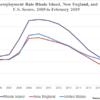Legislation to Avoid SALT Cap Named Bad Bill of the Week
Rhode Island lawmakers continue to stick their heads in the sand when it comes to the stagnant Rhode Island economy and weakening jobs market. Instead of directly addressing the core issues that are producing these negative outcomes, which run counter to positive national trends, the political class prefers to divert attention to band-aid policies that perpetuate the problem.
It is for this reason that H5576, the so-called Business Corporation Tax legislation, has been named the Bad Bill of the Week by the RI Center for Freedom & Prosperity. The legislation seeks to provide small business owners with a dubious option to avoid the $10,000 SALT (State And Local Tax) cap, defined in the 2017 federal tax reforms.
Even the highly respected and nonpartisan Tax Foundation in Washington, DC, wrote a post on the wrong-headedness of this legislation, which seeks to circumvent federal tax laws.
Ignoring the fact that state and local taxes are too high in Rhode Island, driving many people and businesses out of state, the legislation instead seeks to help small business owners by reducing the their federal tax burden; in essence, denying the federal government its lawful share of pass-through revenues that are usually associated with S-corporations, limited partnerships, and sole proprietorships.
State lawmakers should not seek to blame the federal government for the high state and local taxes that they, themselves, have imposed on the private sector. Further, the IRS has publicly signaled that it will not take kindly to state-based efforts to interfere with taxes owed to the federal government.
To encourage entrepreneurship, pass-through entities were created to relieve small business investors of the burden of double-taxation, both at the corporate level and then again upon distribution of profits at the individual level. Instead, profits under a pass-through structure flow entirely to its investors, to be taxed only once at the individual level – both federally and by states.
The 2017 Tax Cuts and Jobs Act limited the amount of SALT deductions allowed on federal tax returns. In high tax states, such as Rhode Island, this means that certain people may not be able to federally deduct all of the taxes they are charged by their state and localities.
The proposed legislation in Rhode Island would allow pass-through businesses to pay “state” taxes on its profits at the ‘entity’ level (instead of passed-through to individuals). This scheme would effectively transpose a potentially non-deductible SALT tax into a fully-deductible business expense. A revenue-neutral policy at the state level, this entity level tax scheme will almost certainly be challenged by the IRS in that it would reduce federal tax receipts.
The proposed legislation in Rhode Island would allow pass-through businesses to pay “state” taxes on its profits at the ‘entity’ level (instead of passed-through to individuals). This scheme would effectively transpose a potentially non-deductible SALT tax into a fully-deductible business expense. A revenue-neutral policy at the state level, this entity level tax scheme will almost certainly be challenged by the IRS in that it would reduce federal tax receipts.
This legislation is objectionable for two main reasons. First, the IRS is unlikely to allow this sleight-of-hand to circumvent existing tax law. Second, and more importantly, the legislation avoids the actual core problem – high state and local taxes in Rhode Island.
As long as lawmakers refuse to deal with the real problems that plague our state, Rhode Island’s economy and the standard of living for its residents will continue to lag behind the rest of the country.
As the Tax Foundation concludes, and as the Center has long maintained, “States would be better off using their creative energy to reform their tax codes and alleviate the overall burden on taxpayers.”




Leave a Reply
Want to join the discussion?Feel free to contribute!